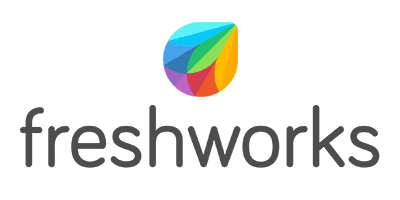Want to streamline operations in your startup? It’s not easy to steer a successful business, especially if you want to make sure every customer interaction runs smoothly. But the secret weapon that many startups use is a high-quality CRM system.
These sophisticated software have showcased their value time and again for small to medium businesses and all startups alike. In this article, we uncover why CRM systems are so prominent for startups today and which ones may be the best fit for your business.
QuickLook: Best CRM for Startups
Why Do Startups Need a CRM?
Keeping up with business trends and best practices is challenging, to say the least. And when it comes to startups, they face unique challenges, such as limited resources or building trust and adapting to rapid changes in the industry.
For these reasons, it is essential for startups to incorporate CRM into their business processes. It helps manage customer relationships, streamline processes, and improve customer satisfaction. In addition, an effective CRM helps increase sales and includes features such as lead management and sales forecasting.
Essential Features to Look for in a CRM for Startups
With the importance of a CRM in mind, let’s go over the key features to look for in a CRM for your startup.
Automation of Basic Tasks
Automating repetitive tasks is pivotal for startups to enhance efficiency. CRM systems allow businesses to set up automation rules for routine activities, such as data entry and lead assignment, ensuring that the team can focus on strategic operations without getting bogged down by manual processes.
Relationship Management
Building and nurturing relationships is the foundation of any business. CRM tools provide a comprehensive overview of customer interactions, from initial contact to sales and post-sale service, ensuring consistent and personalized engagement, which is key to fostering loyalty and trust.
Contact Information Storage and Organization
A cluttered contact list can be a startup’s nightmare. CRM systems come equipped with robust contact management features. They store, categorize, and provide quick access to contact details, ensuring that businesses never miss out on opportunities due to disorganized data.
Email Campaigns and Automation Tools
Email remains a potent tool for marketing and communication. CRM systems incorporate tools that allow startups to design, segment, and automate email campaigns, enabling targeted communication and ensuring that messages reach the right audience at the right time.
Sales Team Tracking and Management
Keeping a tab on the sales team’s performance is pivotal for revenue growth. CRM tools provide dashboards and analytics that track sales activities, goals, and outcomes. This aids startups in identifying top performers and areas of improvement, as well as crafting informed sales strategies.
Real-time Updates on Sales Processes
In the fast-paced world of startups, staying updated is non-negotiable. CRM systems offer real-time notifications and updates on sales activities, ensuring that teams are always informed about the latest developments, leads, and opportunities.
Professional Plan Options for Growing Businesses
Startups aren’t static — they’re constantly evolving. Recognizing this, many CRM platforms offer scalable plan options. As startups grow, they can seamlessly upgrade their CRM capabilities to match their expanding operations and customer base.
Project Management Tools and Generation Tools
Beyond sales and marketing, CRMs can be a hub for project management. Integrated tools help startups plan, execute, and track projects. Additionally, generation tools within the CRM can aid in creating proposals, quotes, and invoices, streamlining the entire client acquisition process.
Top Picks for the Best CRM for Startups
By now, you must have a good idea of what to look for in a CRM. In this section, we cover the top picks for the best CRM for startups.
HubSpot
Grow better with HubSpot
Software that's powerful, not overpowering. Seamlessly connect your data, teams, and customers on one CRM platform that grows with your business.
HubSpot is an all-inclusive inbound marketing, sales, and service platform designed to help businesses attract visitors, convert leads, and delight customers. Its suite includes tools for content creation, email campaigns, lead management, and analytics.
Key features:
- Inbound Marketing Tools: From blogging to SEO, HubSpot offers everything you need to create content that attracts the right audience.
- Sales Hub: Complete visibility into the sales pipeline, automated tasks, and detailed analytics.
- Customer Service Hub: Allows businesses to connect with customers, resolve their issues, and delight them.
Pricing:
- Free Plan: $0
- Starter: $18/month
- Enterprise: Custom pricing
Pros:
- Highly intuitive and user-friendly interface.
- Comprehensive suite that caters to marketing, sales, and service needs.
- Extensive integration capabilities.
Cons:
- Can become pricey as you add advanced features.
- Some features have a steep learning curve.
- Reporting can sometimes be limited in the basic plans.
Salesforce
AI + Data + CRM = more sales and happier customers.
Start or grow your business with the #1 CRM. Salesforce now has AI tools that helps you connect with your customers in a whole new way.
Salesforce is renowned as a leading cloud-based CRM platform, solidifying its reputation worldwide with a comprehensive suite of tools tailored for sales, marketing, and customer service. Recognized for its adaptability and versatility, it serves businesses of all scales, ensuring streamlined operations and enriched customer relationships.
Key features:
- Sales Cloud: A complete solution for sales processes, from lead generation to closing deals.
- Marketing Cloud: Allows creation and management of marketing campaigns.
- Einstein AI: An artificial intelligence layer that offers insights, predictions, and recommendations.
Sales Pricing:
- Essentials: $25/user/month
- Professional: $80/user/month
- Enterprise: $165/user/month
Pros:
- Extremely customizable and scalable.
- Strong third-party app ecosystem.
- Robust reporting and analytics tools.
Cons:
- Can be overwhelming for small businesses.
- Requires training to leverage its full potential.
- Higher-tier plans can be expensive.
Zoho
Bring the very best out of your customer-facing teams with robust automation, comprehensive analytics, personalized solutions, and more. Sign up and get started in no time—the fastest implementation in the enterprise CRM market.
Zoho CRM stands out as a dynamic business management platform tailored to meet the multifaceted requirements of modern businesses. Encompassing sales automation, marketing automation, in-depth analytics, and versatile multichannel communication tools, it promises a holistic approach to managing and nurturing customer relationships.
Key features:
- Multichannel Communication: Connect with customers via email, phone, chat, and social media.
- Sales Signals: Real-time information about how users interact with your business.
- Zoho CRM Analytics: In-depth analytics to make data-driven decisions.
Pricing:
- Standard: $12/user/month
- Professional: $20/user/month
- Enterprise: $35/user/month
Pros:
- Cost-effective solution for small to medium-sized businesses.
- User-friendly with a clean interface.
- Integration with other Zoho products.
Cons:
- Limited features in the basic plan.
- Integration with non-Zoho products can be tricky.
- Occasionally users report slow system responses.
Freshworks CRM
Freshworks CRM stands out with its AI-driven analytics, a user-friendly interface, and a comprehensive toolset that melds sales automation, email tracking, and event tracking. Its holistic approach provides businesses, both big and small, with a 360-degree view of their customers, empowering them to offer personalized interactions and foster stronger relationships.
Key features:
- Freddy AI: Its AI-powered assistant offers actionable insights, automating tasks and predicting the sales trajectory.
- Email Campaigns: Built-in email capabilities with tracking features allow for targeted communication.
- Visual Sales Pipeline: The CRM enables businesses to get a clear view of their sales processes at a glance.
Pricing:
- Growth: $29/user/month
- Pro: $69/user/month
- Enterprise: $109/user/month
Pros:
- Intuitive design which simplifies user adoption.
- Seamless integration with other Freshworks products.
- Robust automation and analytics capabilities.
Cons:
- Some advanced features are limited to higher-tier plans.
- Users might experience occasional lags.
- The mobile app could benefit from further refinement.
Pipedrive
The CRM platform to grow your business
The first CRM designed by salespeople, for salespeople. Do more to grow your business.
Pipedrive markets itself as a CRM built by salespeople for salespeople. The platform emphasizes ease of use, ensuring that businesses can quickly implement and onboard their teams. Beyond its core CRM functionalities, Pipedrive offers features that manage leads, deals, and communications, ensuring that sales teams remain agile, informed, and focused on their goals.
Key features:
- Visual Sales Pipeline Management: Provides a visual overview of sales processes, making it easy to track progress and identify bottlenecks.
- Lead Booster: An AI-powered chatbot and web forms capture leads and integrate them directly into the CRM.
- Sales Assistant: An AI feature offers personalized tips and reminders to keep sales activities on track.
Pricing:
- Essential: $13/user/month
- Advanced: $25/user/month
- Professional: $50/user/month
Pros:
- Highly intuitive, ensuring a minimal learning curve.
- Integration capabilities with a wide range of third-party apps.
- Customizable fields and stages to fit a variety of sales processes.
Cons:
- Limited advanced analytics in basic plans.
- Some users desire more comprehensive email marketing tools.
- Mobile app functionalities can sometimes feel limited compared to the web version.
Choosing the Best CRM for Startups: Key Factors to Consider
Selecting a top-notch CRM for your startup can be tricky. Below, you’ll find some important factors to keep in mind as you sift through the different types of CRM software for your business.
Affordability and Scalability
For startups operating on tight budgets, finding an affordable CRM is paramount. But it’s not just about cost savings; it’s also about future growth. The ideal CRM should be scalable and evolve alongside the startup. This ensures that as the business expands, the CRM can handle increased customer data without necessitating an overhaul. Various CRM platforms offer tiered pricing, allowing startups to start small and upgrade as needed.
Integration Capabilities
A CRM’s power isn’t just in its standalone features, but also in its ability to integrate seamlessly with other tools and systems a startup might already be using. Whether it’s email marketing tools, e-commerce platforms, or accounting software, a good CRM should play well with others. Platforms like HubSpot and Salesforce are known for their vast integration ecosystems, enabling startups to create a unified tech stack.
User-friendliness and Ease of Implementation
For startups without extensive IT departments, a CRM’s user-friendliness becomes even more crucial. The faster a team can onboard and the more intuitive the interface, the better. CRMs like Pipedrive and Freshworks pride themselves on their intuitive design, which allows non-technical users to dive in without steep learning curves, ensuring startups can hit the ground running.
Flexibility and Customization Options
Every startup is unique, and its CRM should reflect that. A one-size-fits-all solution rarely fits all. Startups should seek out CRM platforms that allow them to tailor workflows, dashboards, and processes to their specific needs. CRM systems like Zoho and Salesforce shine in this area, offering a plethora of customization options.
Analytics and Reporting
In today’s data-driven world, insights can make or break a startup. An effective CRM provides powerful analytics and reporting tools, ensuring startups understand customer behaviors, sales trends, and more. This data empowers startups to make informed decisions and refine strategies, driving sustained growth.
Mobile Accessibility
With the rise of remote work and on-the-go entrepreneurship, mobile accessibility in a CRM is no longer just a ‘nice-to-have’ — it’s a necessity. Startups require platforms that allow them to access customer data, track sales, and communicate from anywhere, anytime. Many CRM platforms, including HubSpot and Zoho, offer robust mobile apps ensuring business continuity, no matter where founders or their teams might be.
Pave the Way for a Successful Startup with a Top-Notch CRM
It’s undeniably exciting to launch a startup. The possibilities are endless, and everything is new, like traveling to another country and exploring an unfamiliar city for the first time. However, with great advancements in the business world comes the demand for quality and authenticity. And streamlining operations is a task that many businesses struggle with.
Luckily, with the help of CRM software, you can streamline your workflow and take care of your customers efficiently. So if you’re a budding business in the early stages of the grind, consider using a CRM system to simplify your workflow and set up your business for lasting success.
FAQs
Do startups need a CRM?
Absolutely! Startups benefit from CRMs as they help organize customer data, streamline operations, and enhance customer relationships, setting a foundation for growth.
Why use a CRM for sales?
CRMs elevate sales by organizing leads, automating follow-ups, and providing insights into customer behavior, enabling sales teams to strategize and close deals effectively.
Which CRM is best for startups?
The “best” CRM varies based on a startup’s needs. Platforms like HubSpot and Salesforce are popular due to their scalability and comprehensive features, but the ideal choice depends on a startup’s specific requirements and budget.
What CRM software is best for a small startup?
For smaller startups, user-friendly and affordable options like Pipedrive or Freshworks might be ideal. They offer essential features without overwhelming users or breaking the bank.
How does a CRM benefit a startup’s marketing efforts?
CRMs enhance marketing by segmenting audiences, automating campaigns, and providing data-driven insights, enabling startups to target their messaging and optimize marketing ROI.











